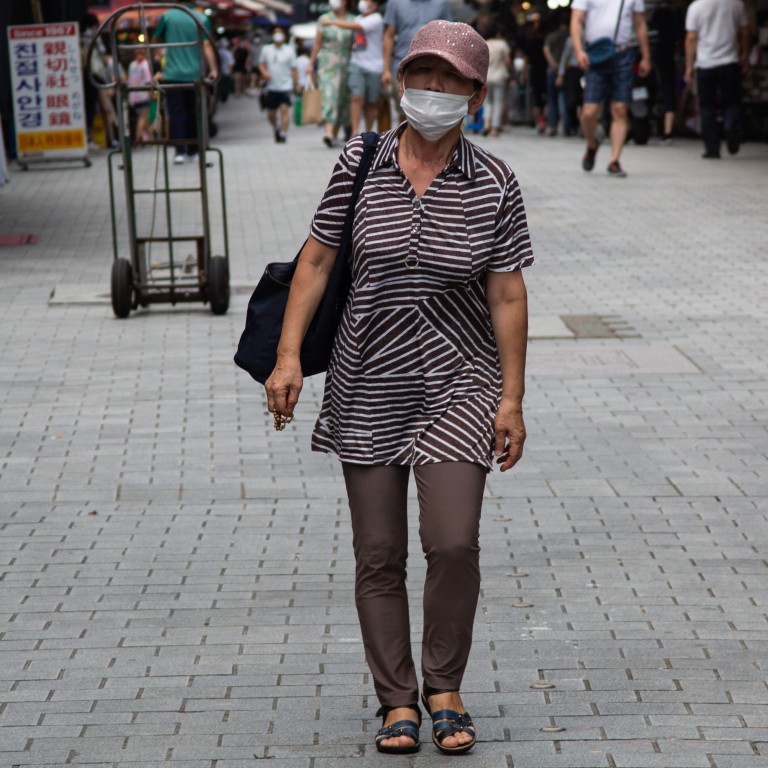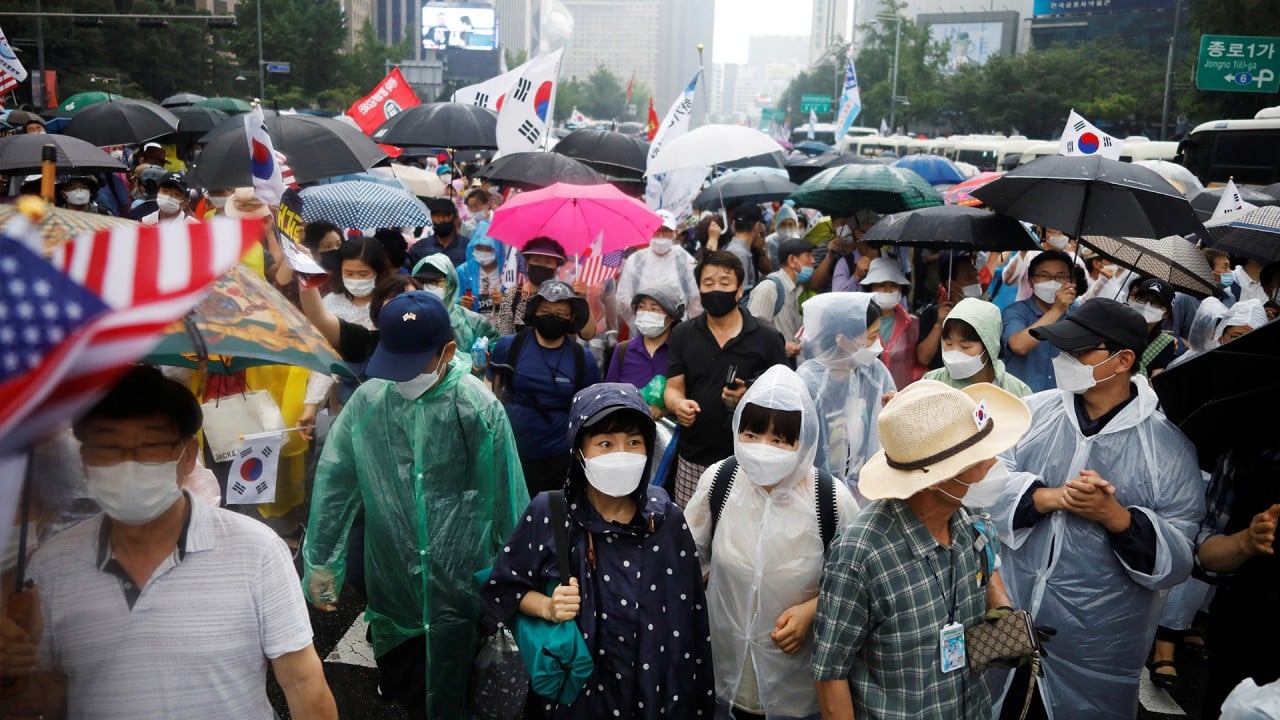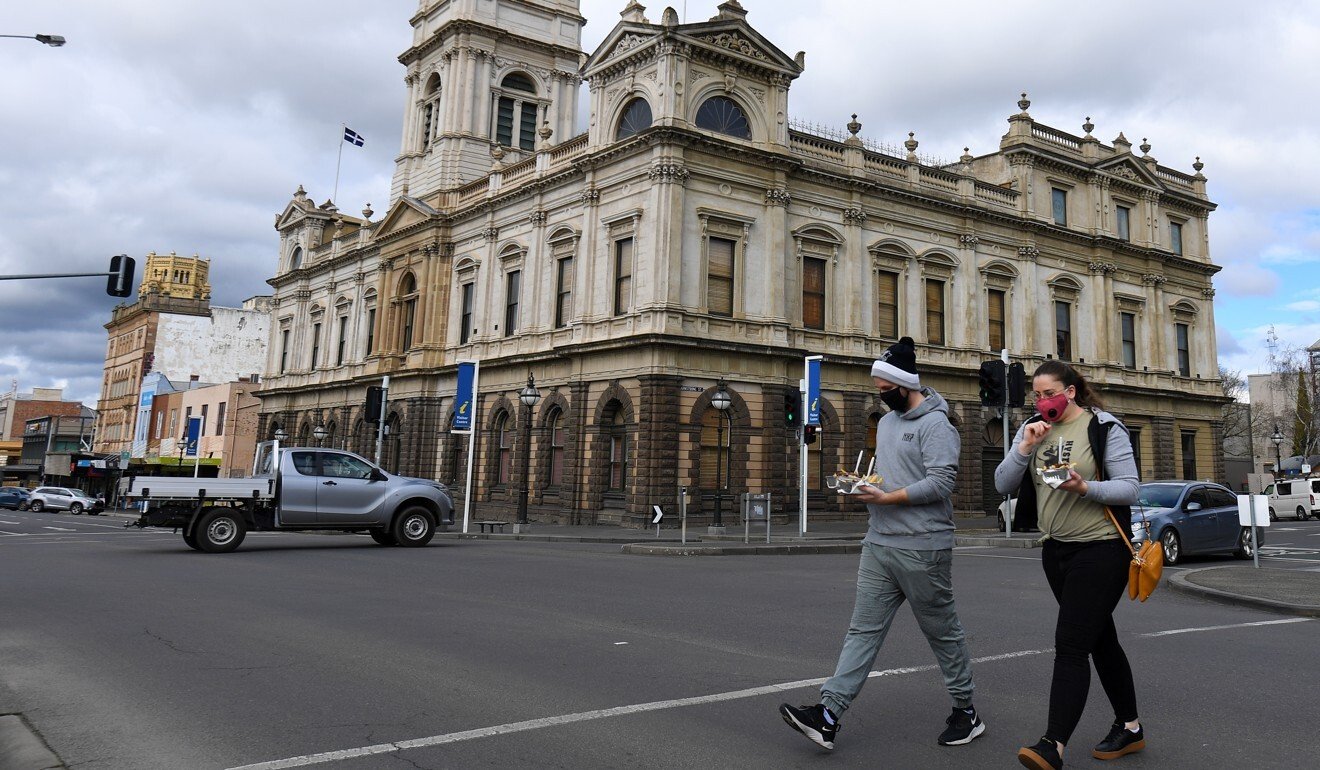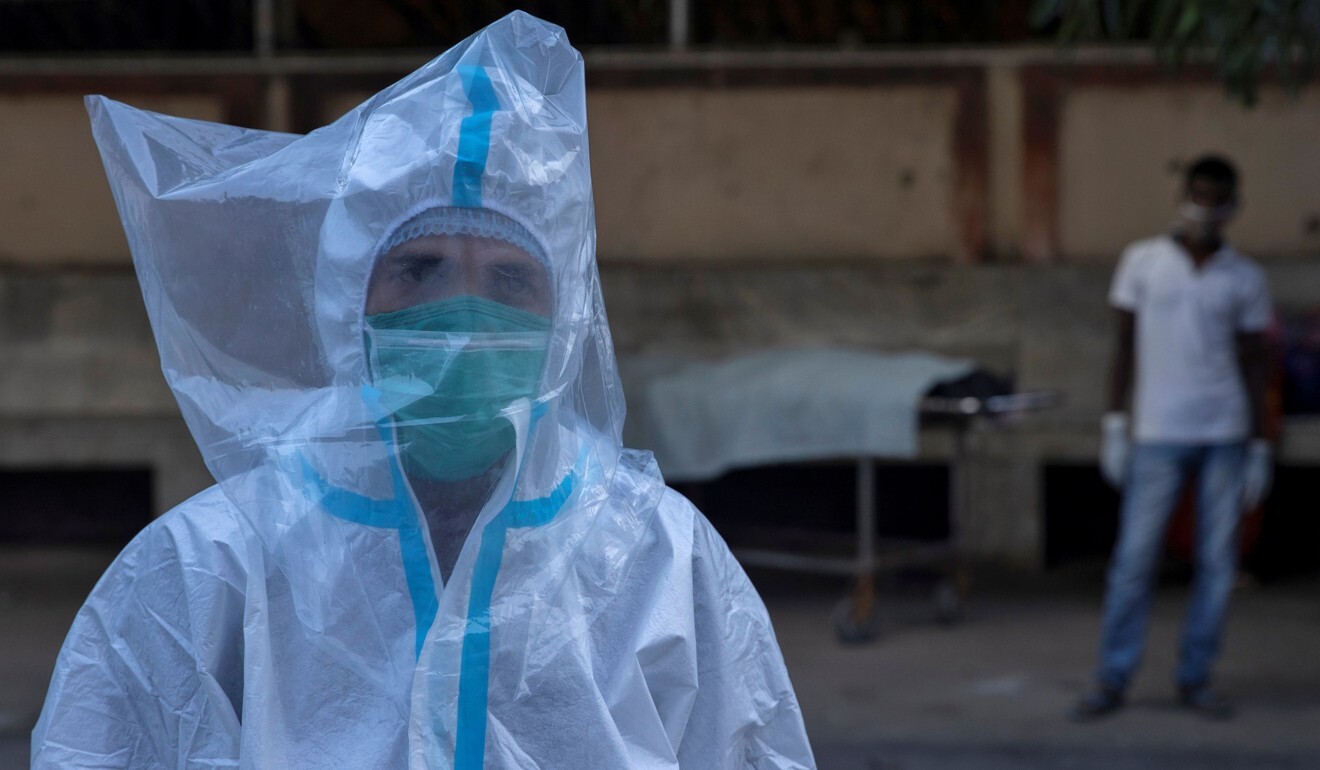
Coronavirus latest: South Korea warns of tighter rules; New Zealand postpones election
- South Korea is battling a new outbreak, including a cluster linked to a church, while Malaysia finds a Covid-19 mutation 10 times more infectious
- Jacinda Ardern has delayed New Zealand’s election to October 17; Australia has recorded its deadliest day; India’s coronavirus death toll has hit 50,000
The outbreak linked to the Sarang Jeil Church in Seoul is the country’s biggest in nearly six months and led to a tightening of social distancing rules on Sunday. The group’s conservative pastor has tested positive for coronavirus and thousands of church-goers have been asked to quarantine.

01:27
South Korea sees biggest coronavirus outbreak in five months with cases linked to church protest
Reverend Jun Kwang-hoon has been organising rallies against liberal President Moon Jae-in, raising concerns that the virus has been spreading at his protests too.
South Korea has been one of the world’s coronavirus mitigation success stories but it has nevertheless battled persistent spikes in infections.
The Korea Centres for Disease Control and Prevention (KCDC) reported 197 new cases as of midnight on Saturday, mostly in the Seoul metropolitan area, marking the fourth day of a three-digit tally. The latest cases brought its total infections to 15,515 including 305 deaths.
The outbreak at the Seoul church has revived fears seen in February when authorities were struggling with an outbreak that emerged in a secretive Christian sect in the city of Daegu and became the country’s deadliest cluster. Authorities are facing some reluctance to cooperate and difficulty in tracking some of the members of the congregation.
South Korea tightens restrictions in Seoul after recent spike
Vice Health Minister Kim Gang-lip said the Presbyterian church had provided inaccurate lists of its members. While 312 of them had tested positive, more than 700 who authorities want to see in isolation were unaccounted for.
“We’re very concerned,” Kim told a briefing, dismissing rumours that authorities would record every church member’s test as positive regardless of the truth. “That’s impossible. We can’t fabricate test results.”
Jun is known for provocative speeches that are often filled with bizarre claims. During Saturday’s protest he said the outbreak at his church was a result of an attack, accusing an unspecified opponent of “pouring” the virus onto the church. The protesters, who sporadically clashed with police, shouted slogans accusing Moon of policy failures, corruption and kowtowing to North Korea.
Malaysia detects more infectious strain
The mutation called D614G was found in at least three of the 45 cases in a cluster that started from a restaurant owner returning from India and breaching his 14-day home quarantine. The man has since been sentenced to five months in prison and fined. The strain was also found in another cluster involving people returning from the Philippines.
The strain could mean that existing studies on vaccines may be incomplete or ineffective against the mutation, said director general of health Noor Hisham Abdullah.
Asia’s vaccine race: who is closest to success, and how will it be administered?
The mutation has become the predominant variant in Europe and the US, with the World Health Organisation saying there is no evidence the strain leads to a more severe disease. A paper published in Cell Press said the mutation is unlikely to have a major impact on the efficacy of vaccines currently being developed.
“People need to be wary and take greater precautions because this strain has now been found in Malaysia,” Noor Hisham wrote in a Facebook post on Sunday. “The people’s cooperation is very needed so that we can together break the chain of infection from any mutation.”
While Malaysia has largely managed to prevent a resurgence of the virus seen elsewhere in the world, the number of new cases found in the country has been picking up. The country confirmed 26 new cases on Saturday, the most since July 28, and added 25 cases on Sunday.

New Zealand postpones election
Ardern was under pressure from political opponents and her coalition partners to shift the original September 19 vote after Covid-19 was detected in Auckland last week, sending the country’s largest city into lockdown.
She said the return of the virus after 102 days without community transmission had rattled Kiwis and could have discouraged some from casting their ballots in a September election.
The centre-left leader, who is riding high in opinion polls, also acknowledged concerns from rivals that curbs on campaigning would unfairly weigh the election in favour of her government.
After spending the weekend consulting party leaders and the Electoral Commission, she chose October 17, the earliest delayed date available to her.
Ardern said the change meant all parties would be campaigning under the same conditions and she would not move the date again regardless of the situation.
“I have absolutely no intention at all to change from this point,” she said. “This decision gives all parties time over the next nine weeks to campaign and the Electoral Commission enough time to ensure an election can go ahead.”
All parties temporarily suspended campaigning in the wake of last week’s outbreak, the source of which remains unknown. The virus was first detected in four family members in Auckland last Tuesday and by Sunday the cluster had grown to 49 confirmed cases.
New Zealand PM begin re-election campaign after successful coronavirus response
The South Pacific nation is following the same strategy that helped contain coronavirus during a seven-week lockdown earlier this year – isolating positive cases, contact tracing and extensive testing.
The earlier success has helped lift Ardern’s personal popularity rating to a record 60 per cent, along with her leadership during last year’s Christchurch mosque attacks and the White Island volcano eruption.
Ardern’s Labour Party is on track to win office in its own right, without the minor party coalition partners – the Greens and New Zealand First (NZF) – it needed during its first term.
The main opposition National Party last week demanded the election be postponed until late November, or preferably next year, saying September 19 was untenable.
Cluster found in Japanese rugby team
Japan confirmed more thanr 640 new cases of novel coronavirus infection on Monday, as Tenri University in Nara Prefecture reported it had suspended the activities of its rugby club after a cluster outbreak was discovered among players.
According to university officials and the Nara prefectural government, 24 infected players had exhibited mild or no symptoms. All 168 rugby players that represent the club reside in a university dormitory in the western Japan city of Tenri.
Fifty-five players as well as six coaches and staff have tested negative for the virus, while the remaining 89 team members will be tested soon, according to the officials.
As urban areas in Japan continue to see high numbers of new cases, many schools across the country reopened on Monday after a summer vacation shortened to allow students to catch up on classes missed due to earlier closures caused by the pandemic.
Tokyo on Monday reported 161 new cases of the novel coronavirus, falling below 200 daily infections for the first time in six days.
The single-day figure followed 260 infections confirmed on Sunday, bringing the average daily new infections in Tokyo over the past week down slightly to 258.7.
But the daily figures, which reflect the most recent totals reported by health authorities and medical institutions, have a tendency to be lower after weekends and holidays, when less testing is conducted.
Of Monday’s tally in Tokyo, cases involving people in their 20s and 30s accounted for roughly half, the metropolitan government said, adding that around 60 per cent had unknown transmission routes.
The capital’s cumulative total now stands at 17,875, accounting for about a third of the nationwide tally of around 57,500.
Australia reports deadliest day of pandemic
Victoria state said 25 people had died from Covid-19 in the past 24 hours, more than the previous worst daily toll of 21 reported nationally on August 12.
Authorities in the southeastern state said 282 new coronavirus cases had been detected, about the same as the 279 cases reported on Sunday.

Those numbers are well below the peak of more than 700 daily cases in Victoria earlier this month and health officials are confident strict lockdown measures are working to contain the virus.
Australia has reported 23,500 Covid-19 cases and 421 deaths, far fewer than many other developed nations.
In New South Wales, children will be banned from playing the recorder and singing in school choirs in a bid to stem the spread. With infections hitting several Sydney schools, authorities moved to prohibit choirs and wind ensembles from Wednesday.
“School formals, dances, graduation or other social events are not permitted,” the New South Wales education department added.
How Covid-19 is changing the world we live in day by day
The leader of the state apologised on Monday for failing to stop people carrying Covid-19 from disembarking from a cruise ship in Sydney in March, triggering that was at the time Australia’s worst outbreak.
The apology from NSW Premier Gladys Berejiklian for her government’s poor handling of the outbreak aboard the Ruby Princess came after a public inquiry concluded last week that NSW health officials made “inexcusable” mistakes when they allowed about 2,700 passengers, 120 of whom were feeling unwell, to leave the Carnival Corp-owned ship on March 19.
The inquiry found 914 infections could be traced back to the Ruby Princess, mostly among passengers. The outbreak led to 28 deaths.
“The lessons weren’t learned soon enough and again I apologise unreservedly on behalf all of those individuals and agencies who made those mistakes,” Berejiklian told reporters in Sydney.

India death toll now over 50,000
The country last week overtook Britain with the world’s fourth-highest number of deaths, behind the United States, Brazil and Mexico, and has recorded 2.6 million infections.
The world’s second-most populated country, home to some of the world’s biggest cities and largest slums, is already the third-most infected nation behind the US and Brazil.
Explainer: As cases surge, how bad is India’s coronavirus situation?
Many health experts however say the real numbers may be far higher due to low levels of testing and because deaths are often not properly recorded in India’s chronically underfunded health system.
Despite the rising death toll, the health ministry tweeted on Sunday that India’s virus mortality rate was “one of the lowest globally” at below two per cent.
“Successful implementation of testing aggressively, tracking comprehensively and treating efficiently through a plethora of measures have contributed to the existing high level of recoveries,” the ministry said in a statement.
Reporting by Agence France-Presse, Bloomberg, Kyodo and Reuters
